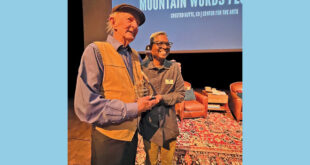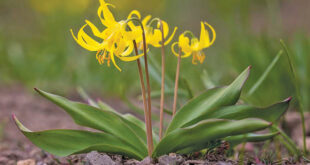Part of the Flying Petito Sisters family, daughter of Pepe Valian and Cindy Petito, Hannah Valian wears two different hats here in town: she is both the water operator at the town’s water plant and also a local hockey coach. She smiles and shares that she’s not really attracted to the spotlight like the famous Petitos who were local stage and radio stars. Hannah grew up in Crested Butte but attended an alternative high school in Denver when her family moved there, in part, to enable her to hone her talent as a competitive hockey player. Hannah became interested in hockey at an early age in CB and played throughout her young adult life in college.
It was in high school that she acquired her love of travel—backpacking through Mexico with her class, interacting with Tarahumara natives for two weeks, camping in tents with a group of about 18 students and three teachers. “That was just totally new and exciting to me and opened my eyes to the thought that the world is so big I want to go see it.”
After Hannah graduated from high school in 2005, she enrolled at Concordia College in Moorhead, Minnesota, to play Division III hockey. The following year, she decided that she didn’t want to spend all her time playing hockey. She transferred to CU Boulder where she instead played club hockey because, she realized, “It was a lower commitment and more fun.”
Hannah took a gap year between her sophomore and junior years at CU Boulder, and moved to New York City where she worked as a restaurant hostess. “I was testing my limits. I didn’t feel like I knew what I wanted to do in college, I just wanted to go big and see what else was out there. To this day NYC is one of my favorite places to visit but I don’t ever want to live there again,” she laughs about her six-month stint in the Big Apple. She returned home to Denver, went back to CU Boulder, and finished her studies at CU Denver, where she graduated in 2011 as an English major with a film studies focus.
Hannah took a job in Burlington, Vermont as an assistant in an alternative high school program called Big Picture. “It was more like being a teacher’s assistant. I taught a film class to a handful of students. I did love Burlington,” she says of her time there from 2011 to 2013. “I got an itch to see somewhere new, which has been a theme,” she laughs. She moved to Portland, Oregon, because, “it seemed cool, although, I didn’t know anybody there,” she explains.
While Hannah was living in Portland working as a barista, a friend told her about work in Antarctica. Since Hannah was looking for a new adventure, she decided to apply for a job at McMurdo Station. She was hired as a janitor and dining room attendant. From there, she fell in love with the community and being on the ice, so she was motivated to stay and pursue a better position. Hannah networked her way into fuel operations. “It entails moving fuel around, for airplanes, helicopters, boats and all the infrastructure. All the buildings run on fuel, all the heat is fuel generated. We’d offload fuel from tankers for use during the winter and make sure there was enough fuel in the tanks to fill all that equipment.”
She recalls the unique nature of the hiring decisions at McMurdo because of the conditions and isolation. The long, dark winters not only called for employees with experience or an aptitude for learning the job, but also for people who were able to get along with others; that last factor was considered a top hiring priority for the tight community who live in close quarters. “I didn’t have a ton of experience with valves, pumps and things that are important to moving fuel around,” but she did have what it takes to play nicely with others within an isolated community, so they hired her back to see how she’d do as a fuel operator. She was there, mostly seasonally, for seven years.
During the winters that Hannah spent at McMurdo, she worked in the waste management department since fueling could only happen in the summer; the winter weather was too frigid and unstable. During the summers, there were multiple flights per week off the ice, but winters would only allow for a couple of flights out all season. She really enjoyed her job. “There was a lot of variety to it, it was an exciting job and allowed me to travel outside of McMurdo a little, which not everybody gets to do. There is a summer field camp called Marble Point, a helicopter refueling station outside the McMurdo Dry Valleys, where they do a lot of science research. In the winter, it’s more of a skeleton crew keeping the main station running. There’s no travel or moving around to do all the science in the winter.”
She tells of the reduced winter crew of about 134 at McMurdo who stayed on from the brutal but beautiful deep winter months of April through August. “The thing I loved most at McMurdo was the people I met who kept me coming back more than anything else. I met some of my best friends there, who are still best friends. It’s pretty special in that way. The other thing is the lifestyle I got to lead outside of Antarctica. I worked four to eight months at a time, and then I traveled a lot.” She says that since she had to fly through New Zealand to get to McMurdo, she spent a lot of time exploring around there, as well as to Australia, Thailand, Indonesia and even Mexico, traveling for months at a time between the Antarctic seasons.
Her last season on the Antarctic ice was 2021, when Hannah returned to Crested Butte as COVID travel restrictions kicked in. “We couldn’t even leave Antarctica because we had to go through New Zealand and we had to leave there immediately. Returning, we had to quarantine at a hotel for two weeks before we could fly to McMurdo. We were only allowed to leave our room to walk outside in a fenced pen and we couldn’t stop, you weren’t allowed to stand and talk to anybody,” she recalls of the strict quarantine policies.
Hannah had planned to come back to CB only for the summer of 2021 since she had a contract to return to McMurdo that October but, in all honesty she says, “I was actually looking for a reason not to return to Antarctica. I was getting exhausted with the seasonal lifestyle, and I was craving some consistency, to put down some roots and see how that felt.” So when the position of water operator became available in town, she figured since she had moved fuel around at McMurdo, she just might qualify. “It’s a different kind of liquid,” she laughs, but thought she could do the job well. She was hired.
Now, as a water operator at the town water plant, her daily and weekly routine entails testing and monitoring the town’s water quality, as well as maintenance of the plant itself and the whole water distribution system that runs to everything in town. She notes that there are still a lot of new water lines going in, mostly for new construction. “It’s a specialized profession and part of what’s nice about the job here in CB is that there’s so much variety to what the three employees [in my department] have to do. It’s a small system, but it’s cool to be part of the whole process from the source of the water all the way to people’s homes.” Hannah explains that in a big city, those jobs often would be individually specialized since those bigger systems require many more workers to operate them.
She still plays hockey and, for the past couple of years, Hannah has been one of two coaches for the local U19 girls hockey team, part of the West Elk Hockey Association (WEHA). “This year has been a rebuilding year. We lost a handful of players last year due to graduation and moving away,” she says. However, new players have also signed up.
Hannah snowboards but, with her hockey schedule, she hasn’t been able to get up on the mountain as much as she would like to. In the summer, she plays softball on the CB Extremes team and loves mountain biking and summer in general.
Now that she’s back home with her two cats Minke and Fin, both of which are named after whales, Hannah feels, “It’s beautiful here with our access to nature and open spaces. It’s really unique. I love being close to my family. There are a lot of really good people here. It’s hard to put my finger on the changes in CB because I haven’t been here consistently, but I still see all the good things I remember from growing up here.”
 The Crested Butte News Serving the Gunnison Valley since 1999
The Crested Butte News Serving the Gunnison Valley since 1999





